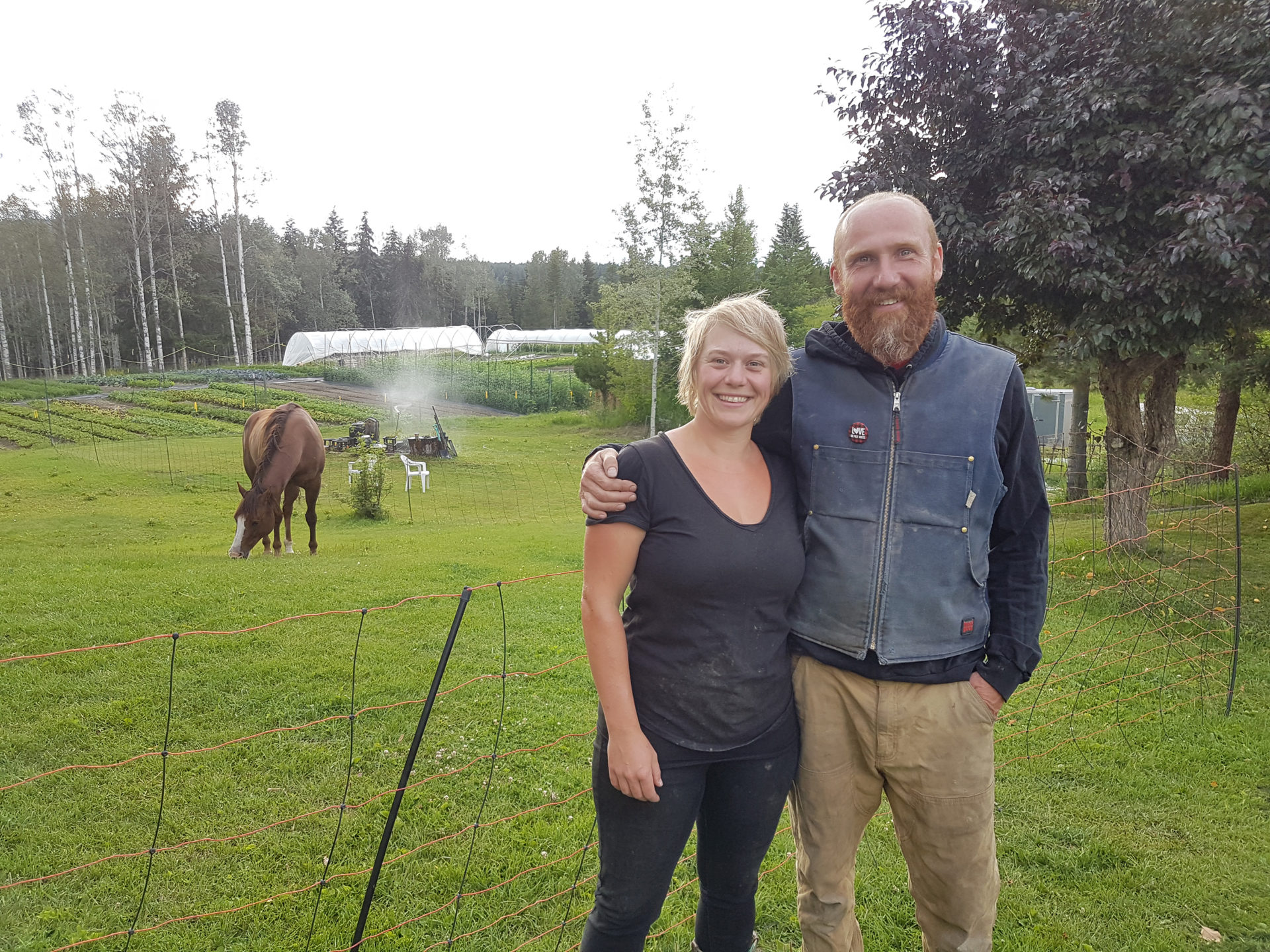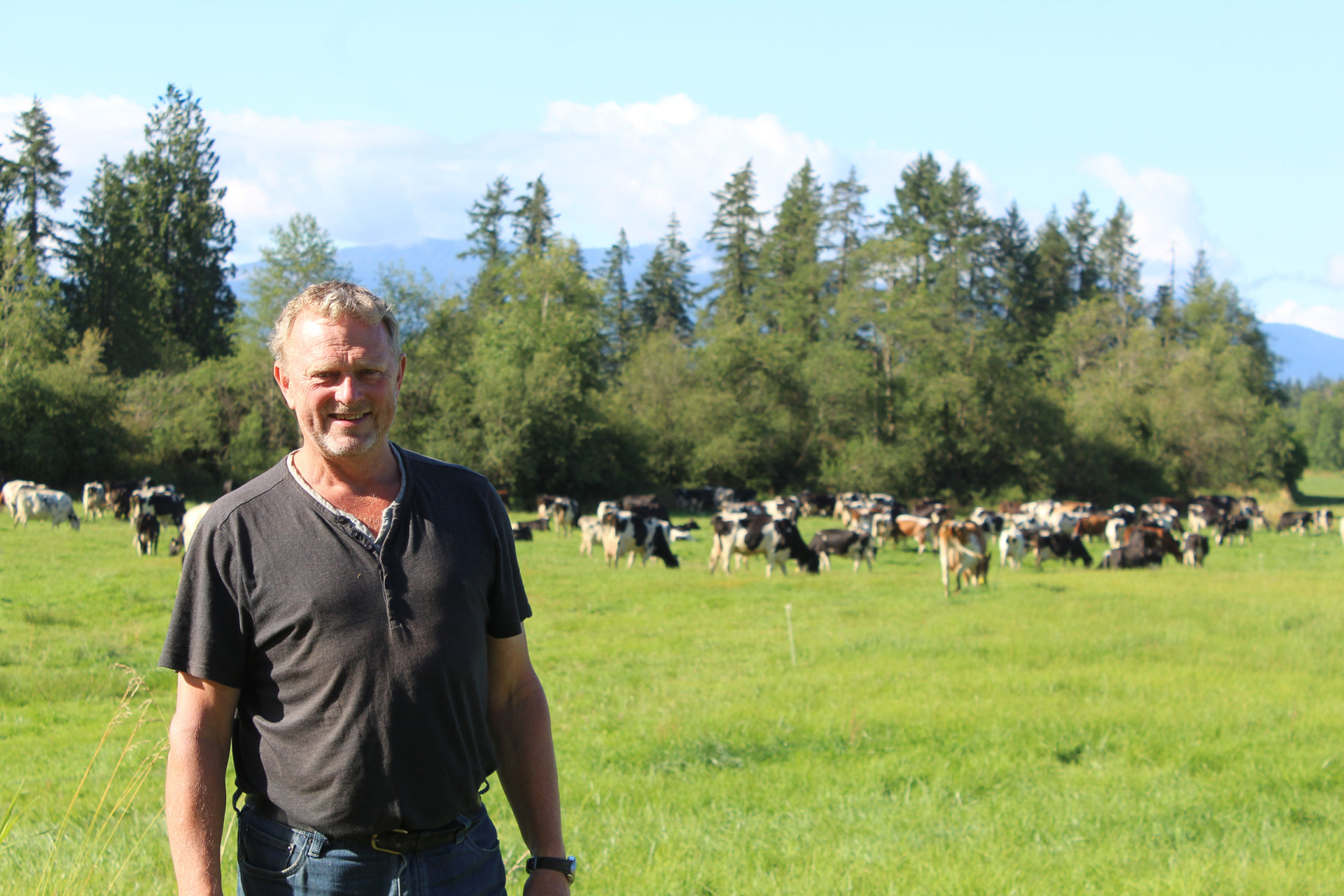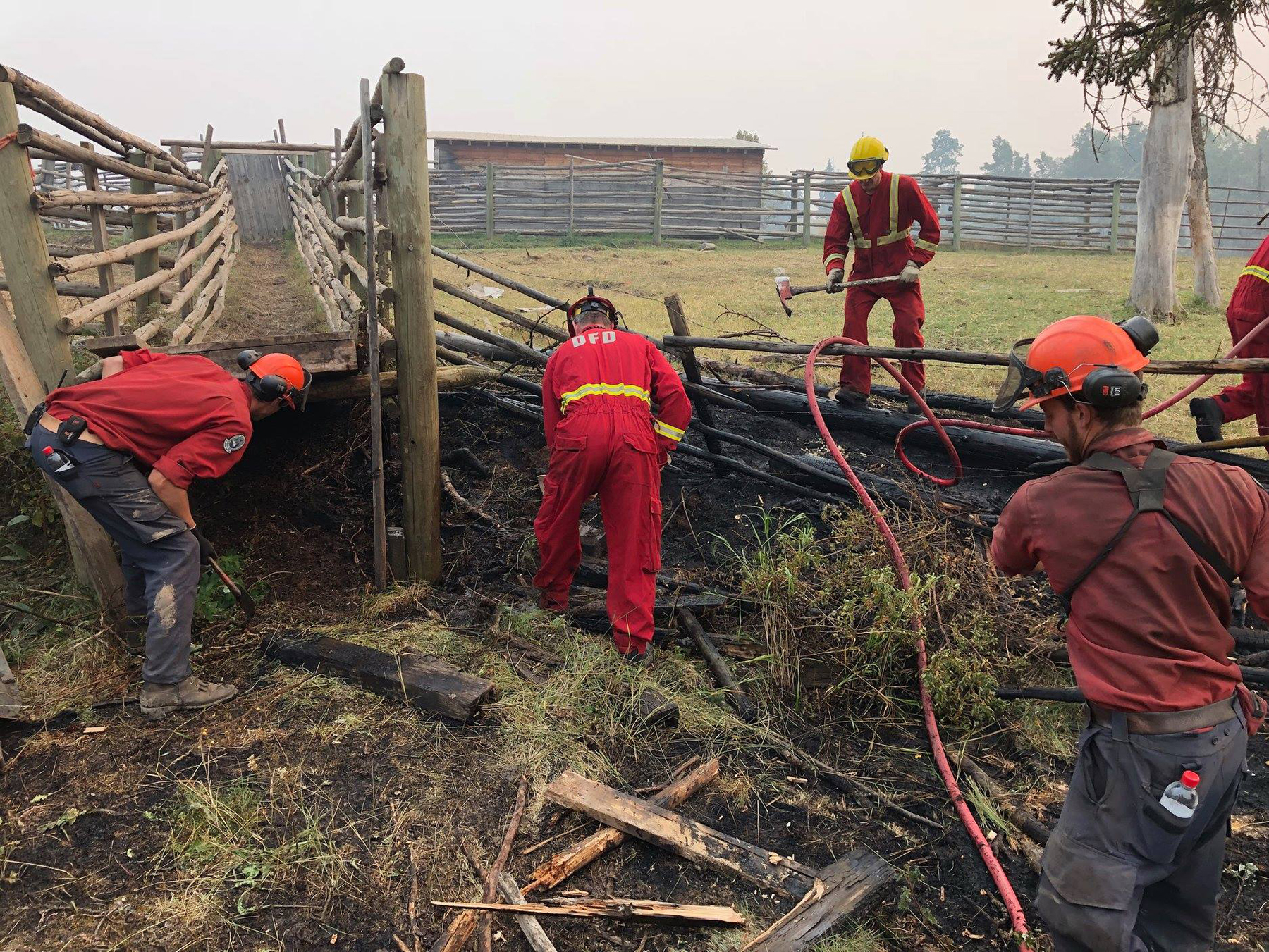100 MILE HOUSE – At 8 pm, Robin Hunt and her husband of almost two years, Johan Bos, are finishing washing and prepping their produce for the next day’s 20-minute drive to the South Cariboo farmers’ market in 100 Mile House. It’s hard work, but both say it’s satisfying to do a job that helps feed people and sustains the land.
Two years ago, the couple turned a half-acre of pasture in Forest Grove into a market garden producing vegetables, strawberries and other small fruit. They also raise heritage chickens for meat and eggs. A herd of pigs was also part of the mix but this year they’re focusing on the garden.
Both were on the coast working, she in film and photography and he as a lighting technician for concerts and other events. They met online but discovered they shared a common best friend. At the time, she lived above a horse barn in Squamish, had a couple horses and was already passionate about farming – for the lifestyle and personal fulfilment.
“The true passion started at 21. I built a 4×20-foot raised bed. It had everything – the tiniest little carrots. I learned lots and my gardens kept getting bigger,” Hunt recalls, saying she eventually convinced Bos to move to a rented farm in the Squamish valley where for two years they raised 30 chickens, boarded horses, had gardens, eggs and launched a small community-supported agriculture (CSA) venture.
“I always wanted to run my own business and did so as a freelancer, so I said let’s give it a shot,” says Bos who, along with Hunt, advise others to spend a year working for someone else on a farm to learn more.
They say they couldn’t have been farmers if they’d had to buy property in Squamish but when Hunt’s grandfather died in 2016 they moved to Forest Grove and Big Rock Ranch to be with her grandmother, Karen Smith. The 148 acres was named for the high rock point on the property that overlooks the house and surrounding countryside. Hunt’s grandparents were both teachers and over the years leased their land for cattle grazing to the neighbouring Pincott Ranches Ltd.
“Johan is in charge of the livestock, bookkeeping, accounting, website design, YouTube and construction and I’m more in charge of the vegetable production and sales, marketing to public, restaurants and businesses and social media,” Hunt explains.
Market gardening here is challenging. The last frost can be as late as June 1 and the first in mid-September. To beat the short season, they’ve constructed two greenhouses and will be doing a third next year to give more plants a head start.
Hunt has strong feelings that food should be raised sustainability, which for her means working towards organic certification.
“We add ladybugs and beneficial nematodes to the garden to deal with issues like wireworms and aphids. We deal with things as nature would,” she explains.
She worries that people don’t think enough about the hours it takes to produce their food or how it reaches them. When wildfires limited travel in and around Forest Grove last year, she was able to provide a measure of local food security with deliveries of produce and eggs from the ranch. It was a small contribution that made her feel good.
Game changers
The couple are avid learners. They’ve borrowed great ideas to farm economically. Their cold storage, for example, is housed in an insulated shipping container cooled by a modified home air conditioner fitted with a CoolBot.
“It tricks the unit to go way cooler than it’s supposed to go. It’s a more affordable way to make a cool room and is way easier and cheaper to fix if something breaks,” Hunt says.
They’ve created a cleaning station for the produce that features an improvised air-bubbling system for washing greens. A washing machine has been retrofitted to spin-dry salad.
“The drying rack and the washing station is from Urban Farmer Curtis Stone and we want to build a germination chamber,” Bos says.
They bought a flame-weeder, a walk-behind tractor and attachments. YouTube videos taught them to build a tiny house that provides additional income as a vacation rental.
A mentorship engagement through Young Agrarians has been a key influence on their farming careers.
“Through meeting others, we began to see that this could be more than just a hobby, that it could be living for the two of us,” says Hunt. “We also obtained a mentor, Seann Dory, who met with us weekly for 30 hours. He started Sole Food Street Farms in Vancouver and is running Salt and Harrow Farm on [Vancouver] Island.”
Dory remains available to them, even though the formal mentorship is over.
“He said, ‘You guys are doing really good, even if you feel like the weeds are out of control and there’s too much work.’ He’s been really good at grounding us and showing us that we’re not alone,” says Bos.
“We usually call him around the burn-out point. … We say, ‘How do you guys do this in eight or 10-hour days?’ and he said, ‘We’re not. We’re doing 12-hour days just like you and it’s hard. It’s July but you will get to winter and have down time,’” Hunt adds. “We love it, but where’s the quality of life? We do try and find balance by taking Sundays off and away from the farm.”
Planning for profit
Recently, they submitted a one-minute video that saw them selected for a lifetime scholarship for The Market Gardener Master Class, an online learning forum for tools like crop plans from Quebec small-scale organic vegetable grower and author Jean-Martin Fortier. It’s a big win because Fortier promotes human-scale, ecological and – as importantly – profitable agriculture.
The couple’s future goal is for the farm to support themselves and a couple of employees. But for now, Bos will continue monthly contract lighting jobs and Hunt may do some film work in the off-season to supplement their farm income and pay back a small loan used mostly for equipment like their 2018 853 BCS Walk Behind Tractor.
“Part of the challenge right now is that we invested a lot,” says Hunt. “We’re seeing good sales, and our CSA members are happy, but it’s not easy. You have to start somewhere and ignite the interest in local farming, especially in a community like ours where people are still getting used to a profitable small-scale farm.”
To that end, she’s chair and he’s a director of the South Cariboo Farmers’ Market Society.
“We’ve talked to others who have reviewed our finances and what we’ve accomplished for a couple of people who just started this two years ago, [and] they say we are doing good,” adds Bos. “You have to set your financial goals and then work backwards. And it’s about determining the level of income you need or want.”


 Armyworm posing little risk this season
Armyworm posing little risk this season